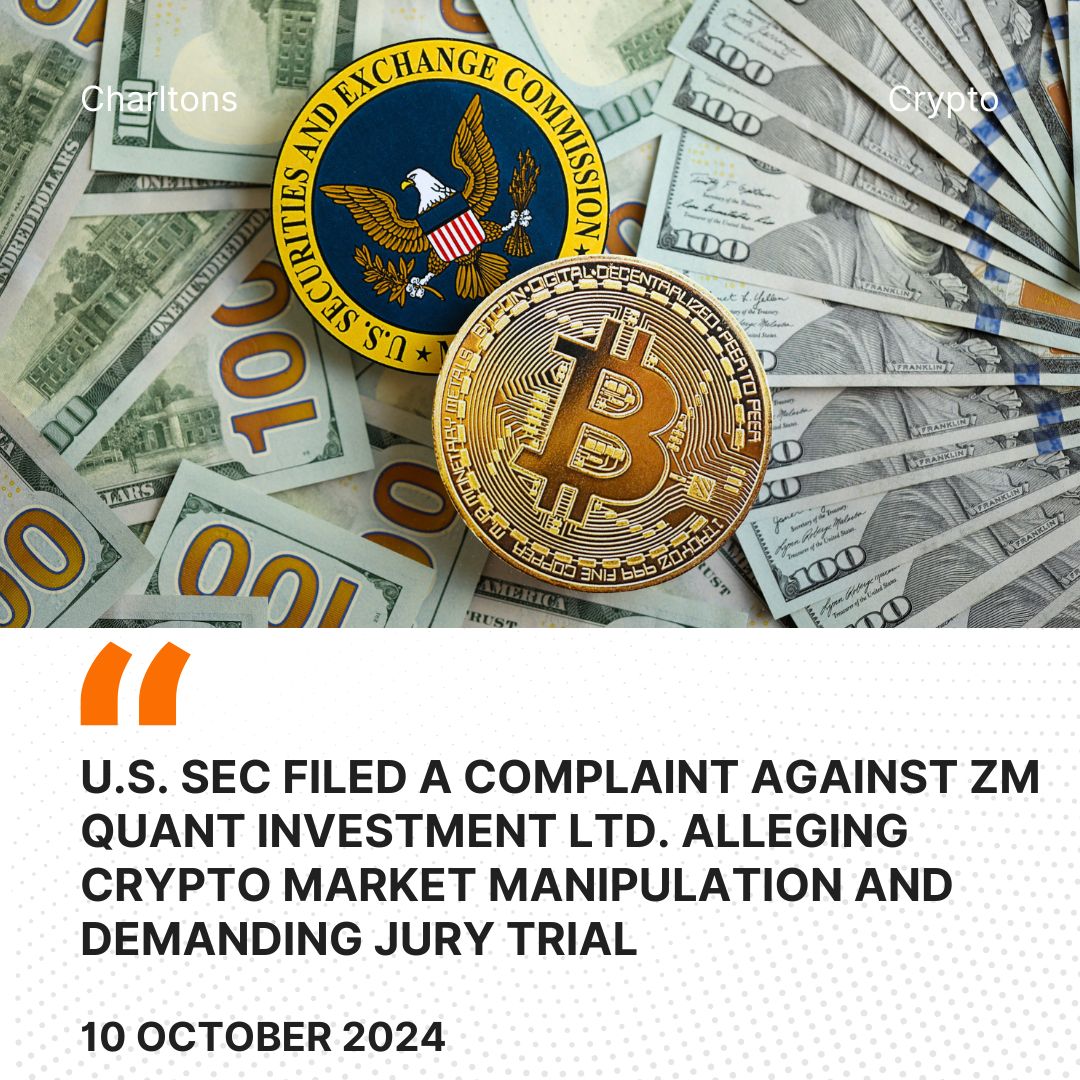
On 9 October 2024, the U.S. Securities and Exchange Commission (SEC) filed a complaint against ZM Quant Investment Ltd., Baijun Ou, and Ruiqi Lau, in the United States District Court for the District of Massachusetts, alleging market manipulation of crypto assets and demanding a jury trial. In its complaint, the US SEC alleges that ZM Quant Investment Ltd. and its principals, Baijun Ou and Ruiqi Lau, manipulated crypto asset markets by artificially inflating the price and trading volume of various tokens. According to the SEC, these actions misled investors and created the illusion of robust market activity, while in reality, ZM Quant was engaging in wash trading and other manipulative practices. The SEC’s complaint further outlines how ZM Quant’s actions harmed market integrity and defrauded investors. The SEC seeks permanent injunctions, disgorgement of profits, civil penalties, and a ban on the defendants’ participation in the securities markets, excluding personal trading.
From 2018-2023, ZM Quant advertised itself as a market maker since 2018, claiming to provide liquidity and support for over 1,100 tokens and 2,500 trading pairs. However, according to the SEC, ZM Quant was actually involved in manipulating the market for these assets by generating artificial trading volume through wash trading. Wash Trading is a manipulative method which involves buying and selling the same asset repeatedly to inflate trading volume and create the false appearance of market demand. Wash trades do not involve a change in beneficial ownership but are designed to mislead investors by suggesting that a security is actively traded.
In May 2024, ZM Quant was hired to manipulate the market for NexFundAI, a crypto asset developed as part of an FBI undercover operation. The NexFundAI team, working with the FBI, engaged ZM Quant in early 2024 to create artificial trading volume for the token. On May 31, 2024, ZM Quant generated $4,600 in artificial trading volume for NexFundAI over a nine-hour period, accounting for 83.6% of the token’s trading volume on the Uniswap platform.
From September 2021 to September 2023, ZM Quant manipulated the market for two crypto assets, Saitama and SaitaRealty, in exchange for monthly fees. In one instance, on May 26, 2023, after a warning from a trading platform about low trading volume, ZM Quant rapidly traded SaitaRealty, increasing its transaction quantity by 412,000,000,000 percent and inflating daily trading volume to billions of dollars within 24 hours.
The SEC’s complaint alleges that ZM Quant and its principals violated U.S. securities laws, including the United States’ Securities Act of 1933 and the United States’ Securities Exchange Act of 1934.
ZM Quant is accused of engaging in fraudulent activities in connection with the offer or sale of securities in violation of Section 17(a) of the United States’ Securities Act of 1933. Section 17(a) prohibits fraud, deceit, and misrepresentations in the offer or sale of securities. It has three sub-sections, with 17(a)(1) addressing the use of deceptive devices, and 17(a)(3) targeting any business practices that operate as a fraud on investors, whether intentional or negligent.
ZM Quant allegedly manipulated crypto asset prices and engaged in fraudulent trading practices, deceiving investors in violation of Section 10(b) of the United States’ Securities Exchange Act of 1934 and Rule 10b-5. Section 10(b) is a broad anti-fraud provision, making it unlawful to use any manipulative or deceptive practices in connection with the purchase or sale of any security. Rule 10b-5 further prohibits any fraud or deceit, including the employment of schemes to defraud, making untrue statements, or engaging in practices that deceive investors. ZM Quant is also accused of manipulating trading volume and prices by creating artificial trading activity in certain crypto assets, thereby inducing others to trade based on false information in violation of Section 9(a)(2) of the United States’ Securities Exchange Act of 1934. Section 9(a)(2) prohibits the creation of false market activity through manipulative transactions that artificially affect the price or trading volume of a security. It is designed to ensure that trading reflects genuine market interest rather than deceptive practices aimed at manipulating prices for personal gain.
The US SEC is seeking legal remedies, including Permanent Injunction, to prevent ZM Quant and its principals from continuing to engage in securities violations, the SEC is requesting a court order that permanently restrains the defendants from participating in any fraudulent activities related to securities, along with disgorgement of Ill-Gotten Gains and the US SEC is asking the court to order ZM Quant to return all profits obtained through its unlawful activities, along with prejudgment interest. The US SEC is also seeking financial penalties to punish ZM Quant for violating securities laws and to deter future misconduct and seeks ZM Quant and its principals be barred from participating in any future securities offerings, with the exception of personal transactions.
(Source: https://www.sec.gov/files/litigation/complaints/2024/comp-pr2024-166-zm-quant.pdf, https://www.sec.gov/newsroom/press-releases/2024-166)





